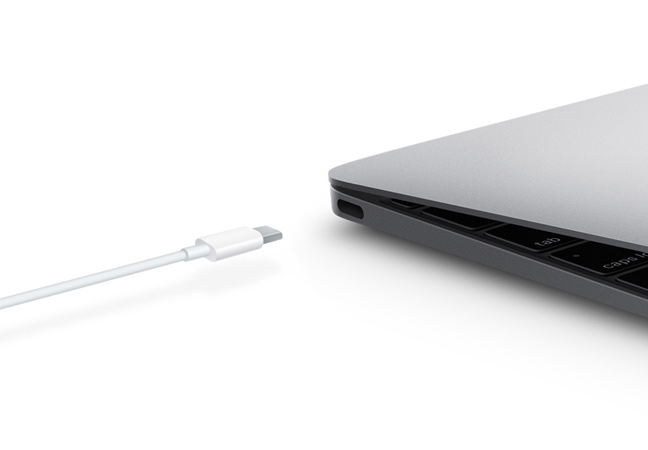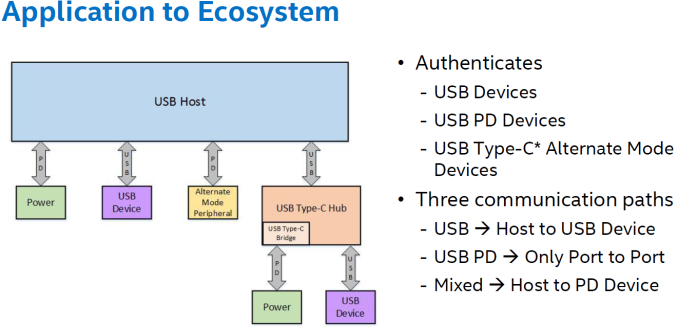USB-C Authentication Tech to Restrict Usage of Uncertified USB-C Accessories and Cables
by Anton Shilov on April 13, 2016 10:30 PM EST
The USB Implementers Forum has announced a new addition to the USB Type-C specification, which is projected to restrict usage of uncertified or potentially malicious accessories with reversible USB-C connectors. The USB Power Delivery 3.0 specification contains a special extension called, the USB Type-C Authentication specification, which promises to help host devices to identify chargers, cables, storage solutions and hosts before making connections. However, to take advantage of the tech, new devices will be needed.
USB interconnections are expected to get more popular than ever thanks to convenience of reversible USB Type-C, its ability to deliver up to 100W of power and support for custom features. However, expanded functionality requires more sophisticated cables with multiple wires and special ID chips, which are more expensive to make than traditional USB cables. As it turned out in the recent months, many cheap cables are not compliant with USB-IF’s requirements; they either do not support high data-rates, cannot charge USB-C devices, or may even damage products they are connected to. The USB authentication promises to end frustrations and make future USB-C devices a little more secure, as an added bonus.
Devices compliant with the USB PD 3.0’s USB-C authentication tech will be able to verify capabilities of accessories compliant with the authentication technology and whether or not they have been certified by the USB-IF. The verification information will be exchanged right after devices are connected, before any data or energy is transferred. The USB-IF will make it possible to set up policies that will restrict usage of incompatible or uncertified accessories with particular host devices.
The USB-C authentication will divide accessories into three types: USB devices, USB power delivery devices (e.g., chargers) and USB Type-C alternate mode devices (e.g., displays). The authentication data messages will be transmitted using different communication paths (USB bus, USB PD or mixed) and will be encrypted using 128-bit methods.
| USB Type-C Authentication Cryptographic Methods | |
| Method | Use |
| Framework (ITU X.509) OID (ITU-T X.402) DER-encoding (ITU-T X.690) |
Certificate format |
| ECDSA (ANSI X9.62) using NIST P-256 curve (NIST-FIPS-186-4) | Digital signing of certificates and authenticationmessages |
| SHA256 (NIST-FIPS-180-4) | Hash algorithm |
| NIST-compliant PRNG source (SP800-90A) seeded with a 256-bit fullentropy value (SP800-90B) | Random numbers |
Based on what is known about the USB authentication, the technology can restrict usage of uncertified cables only in cases their usage is prohibited by manufacturers or end-users users themselves. Moreover, it will only be completely supported by fully-featured cables compatible with the USB Power Delivery 3.0 specifications, which will contain a chip with ID as well as optional vendor defined messages.
According to the USB-IF, it is possible to add the USB-C authentication protocol to host devices by updating their software and firmware, but that will depend on device manufacturers. Since it is not feasible to update things like chargers or cables, they will need to be replaced, or, their usage should be permitted by software-defined security policies. Owners of PCs, tablets and smartphones will be able to authorize only certain accessories to work with their devices, making it impossible to plug a USB flash drive to a host containing confidential data. Nonetheless, once an accessory is authorized, it will be able to work with hosts, harm them or even infect them with viruses. Therefore, the new USB technology is not a replacement for antiviruses.
It remains to be seen how different manufacturers take advantage of the new technology. If implemented too strictly, some hosts may get incompatible with the majority of cheap USB-C products on the market.
At present we do not know when the USB-IF plans to start certification of devices with the USB authentication technology and how the organization plans to certify thousands of cables and chargers. Perhaps, Intel, the company that developed the USB PD 3.0, will reveal more information at its IDF trade-show in the coming days, so, stay tuned.
Source: USB-IF (via Ars Technica)

















28 Comments
View All Comments
Murloc - Thursday, April 14, 2016 - link
so iphones are going to have any non-apple USB-C accessory restricted by default or something?SirKnobsworth - Thursday, April 14, 2016 - link
Hard to day, given that Apple still hasn't put Lightning out of its misery.qlum - Thursday, April 14, 2016 - link
While I can understand the need for cables to be verifiable as being capable of supporting the power needed for a charger I can see this being heavily abused to hinder third party chargers and to undo what the EU tried with everyone using the same cables.I can see future Samsung chargers no longer working on lg phones and so forth. At the very least this will drive up the price of third party chargers due to a need to include the required chips.HomeworldFound - Thursday, April 14, 2016 - link
Yes, this gives companies a reason to sell us a $60 charger when a simple $10 cable will do.Rmattp - Thursday, April 14, 2016 - link
Well, this will give manufactures the ability to make proprietary cables again... great...grant3 - Tuesday, April 19, 2016 - link
Manufacturers <i>already<i> have the ability to make devices that require proprietary cables. A little company named "Apple" is an example.Phones will obviously continue to allow charging without authentication. I'd be surprised if any serious manufacturer required authentication for data transfers.
damianrobertjones - Wednesday, April 20, 2016 - link
I cannot wait for the other standards... Mini-type C, micro-type C, full type-c.All about the $$$$. Speed comes seconds
azerd - Monday, May 2, 2016 - link
I personally feel that that's a very positive thing i think that can give strong securityhere you will find what it takes https://accessories.searchub.com/cables/